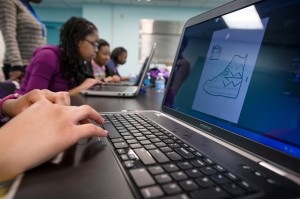This post was originally published on the Common Sense Media Kids Action blog and appears here with permission. Read in Spanish here.

Howard County Library System
In today’s society, access to technology is the path to academic and economic opportunity. This is especially true for kids, who increasingly need access to computers, printers and the Internet to keep up with schoolwork.
But too many American children still don’t have access to the technology they need to succeed. New research from the Joan Ganz Cooney Center shows that this technology is still out of reach for many American families, putting their kids at a disadvantage in the classroom.
The digital divide is creating new challenges for low-income families, and making it harder for many kids to keep up. Ensuring digital equity is essential to ensuring every child gets the right start.
As schools increasingly turn to digital learning tools, it is evermore important for tweens and teens to be able to access school portals and class websites from home. Teachers are moving class reading lists, homework assignments and other important school-related announcements online. Among 10- to 13-year-olds who use computers or the Internet, 81% often or sometimes use computers or the Internet to do homework, according to the Cooney Center report.
Yet for too many Americans – particularly low-income kids – regular Internet access is hard to come by. For middle and upper-income parents focused on limiting their kids’ time spent online, that may not seem like a terrible thing. But the truth is, technology is now so ingrained in our schools that students without it are at a real disadvantage.
The Cooney Center report illustrates that today’s parents understand how crucial Internet access is for their kids’ futures. Cash-strapped, low-income parents prioritize Internet access. More than half of all parents who purchased a computer said the purchase was aimed to improve their child’s education.
But for some, getting online is simply too expensive. Forty percent of surveyed parents who do not have a computer say money is the main reason (by contrast, only 4% say it is because they use computers elsewhere).
Similarly, 42% of those without home Internet access indicated that cost is the main reason that they do not have it. This is particularly true among families below the poverty level, where half of those without a home computer (53%) or home Internet access (50%) cite money as the main reason.
We can do more to ensure online access is available to all. Advocates for digital equity, including Common Sense Media, have made important strides, working with the FCC to modernize and expand the federal E-Rate program to help bridge the digital divide.
But more work needs to be done. As the Cooney Center report shows, Internet service is still prohibitively expensive for many Americans, keeping many low-income kids off line, or trying to access digital content through dial ups and mobile phones. The Cooney Center report finding that cost is an overwhelming deterrent for lower-income families to having their homes wired is one reason advocates are supporting the modernization of the FCC’s Lifeline program to cover broadband access for low income homes.
As we embrace the educational possibilities of technology, it is not enough to ensure our classrooms are wired. We must make sure that all American children have reliable high-speed Internet access at home too, so they can take advantage of the educational opportunities that technology provides. It is up to all of us to make sure all kids keep up in the classroom and at home in our increasingly digital world.
 James Steyer is one of the most respected experts and entrepreneurs on issues related to children’s media and education in the United States. He is Founder and Chief Executive Officer of Common Sense Media, the nation’s leading non-partisan organization dedicated to improving media and technology choices for kids and families. He is also the Founder and Chairman of the Center for the Next Generation.
James Steyer is one of the most respected experts and entrepreneurs on issues related to children’s media and education in the United States. He is Founder and Chief Executive Officer of Common Sense Media, the nation’s leading non-partisan organization dedicated to improving media and technology choices for kids and families. He is also the Founder and Chairman of the Center for the Next Generation.



